
Outsourcing Rulemaking Powers
Constitutional limits and national safeguards
Seiten
2022
Oxford University Press (Verlag)
978-0-19-289783-1 (ISBN)
Oxford University Press (Verlag)
978-0-19-289783-1 (ISBN)
Outsourcing Rulemaking Powers identifies the shared constitutional principles that determine the limits to the outsourcing of rulemaking powers. Through the examination of multiple countries, this book argues that there should be minimal legal safeguards to which all rules must heed, in particular those made by autonomous public or private actors.
Within democratic states, parliaments have always been regarded as playing a pivotal role in the creation of rules. Through its composition, parliament represents the opinions and interests of society, which it serves through the legislative process. But in an increasingly globalized world, nation-states are confronted with issues that require international cooperation, expert knowledge and flexibility to resolve. Rather than taking the lead, parliaments are increasingly settling for a managerial position and have begun to outsource their rulemaking powers (and other constitutional responsibilities) rather than exercising them themselves.
Outsourcing Rulemaking Powers identifies the shared constitutional principles that determine the limits to the outsourcing of rulemaking powers. It asks fundamental questions of its readers, such as: which powers should be outsourced? And to whom? What mechanisms are in place to guarantee the quality of the rules they make? Through the examination of multiple countries, this book argues that there should be minimal legal safeguards to which all rules must heed, in particular those made by autonomous public or private actors. Offering a bridge between traditional constitutional law and transnational private law, this book will be of interest to both practitioners and scholars within the global communities of comparative constitutionalism, global administrative law and transnational private law.
Within democratic states, parliaments have always been regarded as playing a pivotal role in the creation of rules. Through its composition, parliament represents the opinions and interests of society, which it serves through the legislative process. But in an increasingly globalized world, nation-states are confronted with issues that require international cooperation, expert knowledge and flexibility to resolve. Rather than taking the lead, parliaments are increasingly settling for a managerial position and have begun to outsource their rulemaking powers (and other constitutional responsibilities) rather than exercising them themselves.
Outsourcing Rulemaking Powers identifies the shared constitutional principles that determine the limits to the outsourcing of rulemaking powers. It asks fundamental questions of its readers, such as: which powers should be outsourced? And to whom? What mechanisms are in place to guarantee the quality of the rules they make? Through the examination of multiple countries, this book argues that there should be minimal legal safeguards to which all rules must heed, in particular those made by autonomous public or private actors. Offering a bridge between traditional constitutional law and transnational private law, this book will be of interest to both practitioners and scholars within the global communities of comparative constitutionalism, global administrative law and transnational private law.
Cedric Jenart holds a Doctor of Laws (Ph.D.) from the University of Antwerp. He also holds an LL.M degree (Harvard Law School as a Fulbright Boas and B.A.E.F. scholar), a Master of Laws (University of Antwerp and the Free University of Berlin on exchange, summa cum laude) and a Bachelor of Laws (University of Antwerp). He currently works as a magistrate (Auditeur) at the Belgian Council of State, after ranking first at the national comparative exam. Cedric Jenart previously interned at the Belgian Constitutional Court and at various international law firms. He remains active at the University of Antwerp as a visiting lecturer (Gastprofessor).
| Erscheinungsdatum | 18.10.2021 |
|---|---|
| Reihe/Serie | Oxford Comparative Constitutionalism |
| Verlagsort | Oxford |
| Sprache | englisch |
| Maße | 170 x 270 mm |
| Gewicht | 628 g |
| Themenwelt | Recht / Steuern ► EU / Internationales Recht |
| Recht / Steuern ► Öffentliches Recht ► Völkerrecht | |
| ISBN-10 | 0-19-289783-7 / 0192897837 |
| ISBN-13 | 978-0-19-289783-1 / 9780192897831 |
| Zustand | Neuware |
| Haben Sie eine Frage zum Produkt? |
Mehr entdecken
aus dem Bereich
aus dem Bereich


